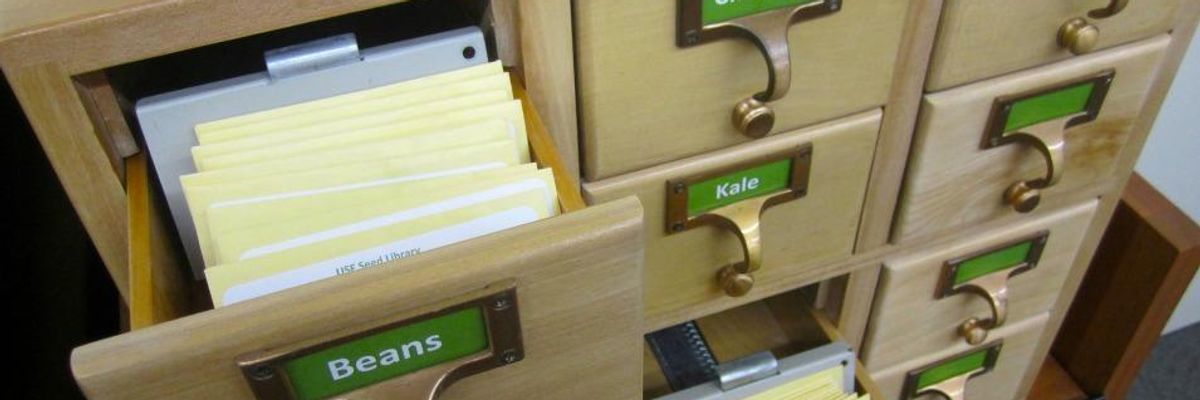Neil Thapar first encountered seed issues in law school when he worked with the Center for Food Safety against genetically-modified food. But it was a season spent working on an organic farm in Santa Cruz, California when he began to understand, first-hand, the importance of seeds as a foundation of our agricultural system. He explains, "When I came off the farm I said, 'If I'm going to be a lawyer, I'm going to be a lawyer doing things that I think are making a positive difference.'"
Thapar is now the point person for Save Seed Sharing, an advocacy and education campaign to protect and promote seed sharing in the U.S. He's leading the campaign for the Sustainable Economies Law Center (SELC)--where he's a staff attorney--and campaign partner Shareable.
At the heart of the seed issue, which started in June when agriculture officials in Pennsylvania cracked down on the Joseph T. Simpson public library's seed library, is that a number of states are now applying laws meant for big, commercial seed producers to small, citizen-run seed libraries. According to SELC, "in order to give out member-donated seeds, the Simpson Seed Library would have to put around 400 seeds of each variety through impractical seed testing procedures in order to determine quality, germination rate, and so on." The concern among seed activists is that seed libraries (about 300 in the U.S.) will be regulated out of existence if this trend continues.
"The goal [of seed sharing]," says Thapar, "is to preserve and promote genetic diversity by having people grow tons of different plants all over the place rather than having one single crop being grown on a massive scale that becomes more and more susceptible to a shock to the system and it will be harder and harder to recover from." He adds, "It represents a strategy that we have to follow if we want to develop a more resilient agricultural system."
For the Save Seed Sharing campaign, SELC is partnering with Shareable, Richmond Grows, several other organizations including Seed Matters, SeedSavers Exchange, and concerned citizens. The campaign is designed to educate people about seed sharing issues, support seed sharing communities, and reform overzealous seed laws. The campaign goals are:
- Educate stakeholders about how seed laws apply to seed sharing through seed libraries.
- Build public awareness and grassroots support for seed libraries.
- Empower local stakeholders to engage in policy advocacy to support seed sharing.
- Remove legal barriers to seed sharing through seed libraries.
- Support seed libraries that face regulation under seed laws.
The tactics to be taken for the campaign are as follows:
- Research and publish analysis of 50 state seed laws.
- Create an online petition campaign directed to state agriculture departments to raise awareness and support for changing seed laws as they apply to seed libraries.
- Publish articles and engage with the media on issues related to seed sharing.
- Organize state coalitions of the seed advocates to work on policy changes to support seed libraries.
- Create policy recommendations, including sample legislation, for changing seed laws to create clear legal space for seed libraries and seed sharing.
- Create legal resources and offer legal advice to seed libraries who face regulation under state seed laws.
- Offer educational materials on how seed laws apply to seed sharing.
- Attend meetings with regulators to negotiate alternatives to regulating seed libraries under seed laws.
Key resources for the campaign are an online petition urging state officials to protect seed libraries from inappropriate regulation; an in-the-works guide to seed libraries that will include best practices, how to start a seed library, how to introduce people to the concept of seed libraries, and how to train seed librarians and library users; and a set of policy recommendations for people to use to change seed laws and engage city and state officials in supporting seed libraries.
For Thapar, the best case scenario for the campaign is to gather 10,000 signatures on the Save Seed Sharing petition; pass laws in at least two states this year that amend the seed law to support seed libraries and explicitly exempt seed libraries from seed laws; and that other states look to those laws as models and incorporate the changes into their state seed laws. Ultimately, what he would like is that this becomes the new standard for what a seed law is and that the amended draft gets put into the Revised Seed Law, a model bill that the Association of American Seed Control Officials creates.
"If we could get an explicit exemption in there," says Thapar, "that would really have a lot of effect in terms of protection and the stability that seed sharing would have moving forward."
Please sign the petition today to help protect seed sharing in the U.S.

